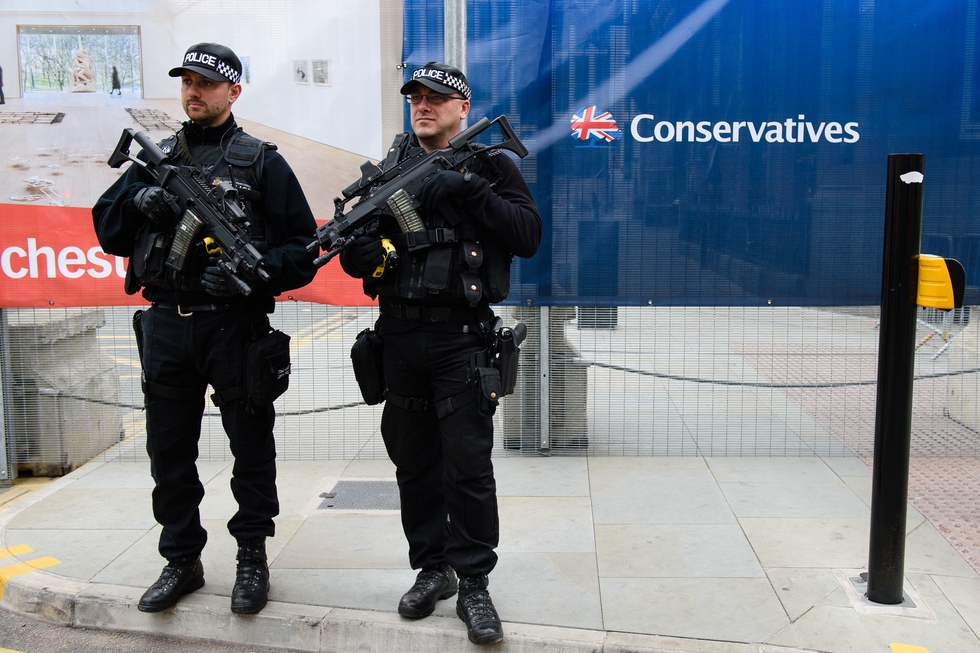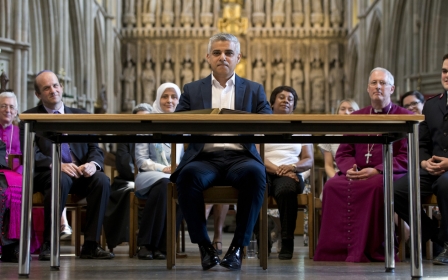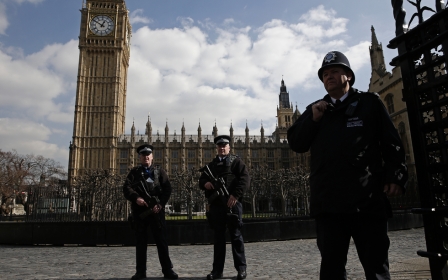UK police apologies for Islamophobia are no longer enough

On Monday, Greater Manchester Police decided to run a counter-terrorism simulation exercise as part of a campaign to raise the state of preparedness of Britain’s boys in blue should the worst come to pass. The following day, they issued an apology for the way in which they handled this exercise. Why, pray tell? Should we not be pleased that they are training themselves for the worst-case scenario? Why are they apologising for making themselves ready to take on crime and criminals?
The reason is because, rather than stopping real crime and criminals, their shenanigans on Monday were little more than a pantomime thrown for the benefit of our mass consumerist society that consumes inordinate amounts of racist drivel designed to demonise Muslims in a variety of ways, hurled at us day in, day out through our media by the likes of Rupert Murdoch and social pariahs like Katie Hopkins. (Hopkins’ former reality TV boss, Lord Alan Sugar, even branded her as “obnoxious” and asked her to put a sock in it, little good that did.)
The police apparently thought it would be an excellent idea to have their terrorist simulation feature a terrorist running through the Trafford Centre, screaming “Allahu akbar!” at the top of his lungs before detonating explosives. For some reason, social sensitivities were completely ignored by the police in their decision to use a phrase used by all Muslims every single day of their lives and, through this act, Greater Manchester Police helped pander to the narrative peddled by the likes of Murdoch, as if the bigots needed any help from the police.
Their apology came with an explanation that they wanted to simulate an IS-style attack, but that belies the fact that a general institutional prejudice against Muslims held by police forces around the United Kingdom exists. The British government’s widely criticised and controversial flagship counter-terrorism policy, Prevent, contains among its indicators that an individual is becoming radicalised that they have recently grown a beard. Hipsters need not worry, though, as the radicalisation associated with facial hair is only applicable if it is linked to religion, and the implication is that it is specifically the religion of Islam.
I myself have felt this institutionalised racism on too many occasions to recount in one article. For a short period in the late noughties, I would be stopped and searched by the same police officer every Wednesday without fail at the same tube station. He would rifle through my gym bag, and feign any knowledge of ever having seen me before, until he became rather cross after I suggested we should start dating if he kept up his “routine checks”.
Not long ago, I was stopped at Heathrow Airport and told that my past addresses and association with the University of Exeter had to be checked (as if one would lie about being a bookish academic) because I had disembarked from a Turkish Airlines flight. After my story “checked out”, I informed the officer that I was intrigued that every other Briton on the same flight as me, who differed to me only in their skin colour (read: they were white), was not being similarly checked. He also eventually got annoyed, suggesting we would be having a very different kind of conversation “in the back” if he truly believed I was a terrorist, whatever that suggested.
Ethnic minorities and Liverpool
What many Muslims today are facing today is not unique only to members of their faith. People of ethnic minorities (most notably black people) who are not necessarily Muslim have long been treated with discrimination by law enforcers – although justice itself was meant to be blind.
And speaking of justice, let us not forget how the whole city of Liverpool was demonised by the Murdoch press when the South Yorkshire Police felt the need to cover up its own misconduct in the Hillsborough disaster. Haven't we learned anything about demonising entire communities?
To be clear, I do not believe that the majority of police officers are inherently racist. In fact, I know a good deal of honest, kind and good-natured police officers, with whom I enjoy excellent relationships and who have always tried to be helpful whenever I contact them. This much I told officers and others present at an event for British-Muslim leaders generously hosted by the London Metropolitan Police Service last month, where I met a number of other fine, upstanding individuals, including various MPs and Muslim members of the force.
However, I did raise concerns regarding the Prevent policy and other problems commonly faced by Muslims, and expressed how important it was for the police to maintain close, mutual and trusting relations with the Muslim citizens under their care. Indeed, research conducted elsewhere has shown that Muslims (much like other segments of the demography, I am sure) are very likely to report extremists if they trust the police, and so these kinds of relations are crucial.
The theatrics pulled off by the police in the Trafford Centre is the precise opposite of that mutual respect, trust and close cooperation I discussed above. Instead of focusing on terrorism as a general malaise, they decided to frame a potential terrorist attack as being linked to Muslim extremists rather than any other group. This is despite the fact that Europol and other organisations have reported that, over the years, less than 2 percent of all terrorist incidences are as a result of religious extremism (including other religions, not just Islam). That means that 98 percent of terrorism can be linked to ethno-nationalist separatist groups, far-right racist terrorists (a phenomenon casually glossed over by the press), and other non-religious and definitely non-Muslim related groups and individuals.
As such, it is no longer good enough for police forces to simply apologise after they smear and demonise the good name of the overwhelming majority of upstanding, British-Muslim citizens. The Home Office needs to reassess its counter-terrorism policies, reassess how Prevent works and enforce a trickle-down cultural shift that shows that Muslims are a part of the solution, not a part of the problem, and that acknowledges and expounds the fact that the vast majority of terrorists are nothing to do with Muslims or religion, as evidenced research and statistics show.
To continue to apologise after something terribly Islamophobic occurs shows that it is acceptable to insult and vilify Muslims so long as you swiftly apologise afterwards. By that point, the damage is done and, rather than protecting and serving their fellow British-Muslims, they would have instead contributed to the cultivation of a climate of fear and hatred against Muslims that will lead to violence against them. That is simply unacceptable, and must not be allowed to happen again.
- Tallha Abdulrazaq is a researcher at the University of Exeter's Strategy & Security Institute, and winner of the Al Jazeera Young Researcher Award. He blogs at thewarjournal.co.uk and tweets from @thewarjournal
The views expressed in this article belong to the author and do not necessarily reflect the editorial policy of Middle East Eye.
Photo: Armed British police officers stand guard outside the main entrance to the Conservative party conference in Manchester, north west England, on 4 October, 2015 (AFP).
New MEE newsletter: Jerusalem Dispatch
Sign up to get the latest insights and analysis on Israel-Palestine, alongside Turkey Unpacked and other MEE newsletters
Middle East Eye delivers independent and unrivalled coverage and analysis of the Middle East, North Africa and beyond. To learn more about republishing this content and the associated fees, please fill out this form. More about MEE can be found here.





